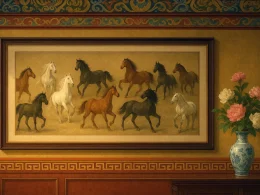I dwell among green hills and someone asks me why;
My mind care free, I smile and give him no reply.
Peach petals fallen on running water pass by,
This is an earthly paradise beneath the sky.
Original Poem:
「山中问答」
李白
问余何意栖碧山,笑而不答心自闲。
桃花流水窅然去,别有天地非人间。
Interpretation:
"A Reply" is a poem written by the Tang Dynasty poet Li Bai during his seclusion in the verdant mountains. At the time, the 30-year-old Li Bai was living in seclusion on Baizhao Mountain in Anlu and had deeply fallen in love with the tranquil natural surroundings. Through this poem, he expresses his passion for the reclusive life and his detachment from worldly affairs.
First Couplet:“问余何意栖碧山,笑而不答心自闲。”
When asked why I dwell in the emerald hills, I smile without answering, my heart at ease.
These opening lines, framed as a dialogue, introduce the reason for the poet's seclusion. By responding with a smile and silence, Li Bai conveys a sense of joy and restraint, while also adding an air of mystery that invites readers to ponder. The lines reflect the poet's inner peace and his indifference to the noise of the mundane world.
Second Couplet:“桃花流水窅然去,别有天地非人间。”
Peach blossoms drift away with the flowing stream, a world apart, beyond the realm of men.
These lines draw on the imagery from Tao Yuanming's "The Peach Blossom Spring," depicting the enchanting natural scenery of the green mountains. Through the imagery of peach blossoms and flowing water, the poet paints a picture of a fairy-tale-like retreat, expressing his admiration for the natural environment and the joys of a life cut off from the world.
Writing Characteristics:
- Colloquial Language: The poem's language is simple and natural, resembling everyday conversation, making it fluid and vivid.
- Engaging Question-and-Answer Format: The poem begins with a question, creating suspense and drawing the reader in.
- Use of Allusion: The reference to "The Peach Blossom Spring" enriches the poem's cultural depth.
- Fresh and Far-reaching Imagery: The imagery of peach blossoms and flowing water creates a serene and transcendent atmosphere, detached from the mundane world.
Overall Appreciation:
"A Reply" uses a question-and-answer format to express the poet's love for reclusive life and his yearning for nature. The opening question sets the stage, while the response, "I smile without answering," leaves room for interpretation, showcasing the poet's contentment. The latter lines use vivid imagery to depict the fairy-tale-like scenery of the green mountains. The poem is tightly structured, with concise language and subtle allusions, reflecting the poet's transcendent state of mind, detached from worldly concerns.
Enlightenment:
In an era where the flood of information sweeps modern people into a "digital green mountain," Li Bai's wisdom of seclusion reveals remarkable modernity. In the age of social media, "smiling without answering" can be transformed into selective silence amid the bombardment of information, akin to carving out a spiritual sanctuary within the noise. Meanwhile, the flowing imagery of "peach blossoms drifting away with the stream" reminds us that we need not seek a Walden-like physical isolation. Instead, we can plant poetic moments in the cracks of daily life—a poem during a commute or a pot of greenery on an office windowsill can become a "world beyond men" for modern people. More importantly, Li Bai's construction of a "third space" centered on the green mountains offers a model for spiritual突围 (breaking through) for contemporary individuals trapped in 996 work schedules and internal competition. There's no need to completely escape; one only needs to guard their flow state within the digital cave and build their own "ladder to the moon" within the human world. This wisdom of being both engaged in and detached from the world is precisely the most precious gift that the poets of the High Tang left for the post-pandemic era.
Poem translator:
Xu Yuan-chong(许渊冲)
About the poet

Li Bai (李白), 701 - 762 A.D., whose ancestral home was in Gansu, was preceded by Li Guang, a general of the Han Dynasty. Tang poetry is one of the brightest constellations in the history of Chinese literature, and one of the brightest stars is Li Bai.











